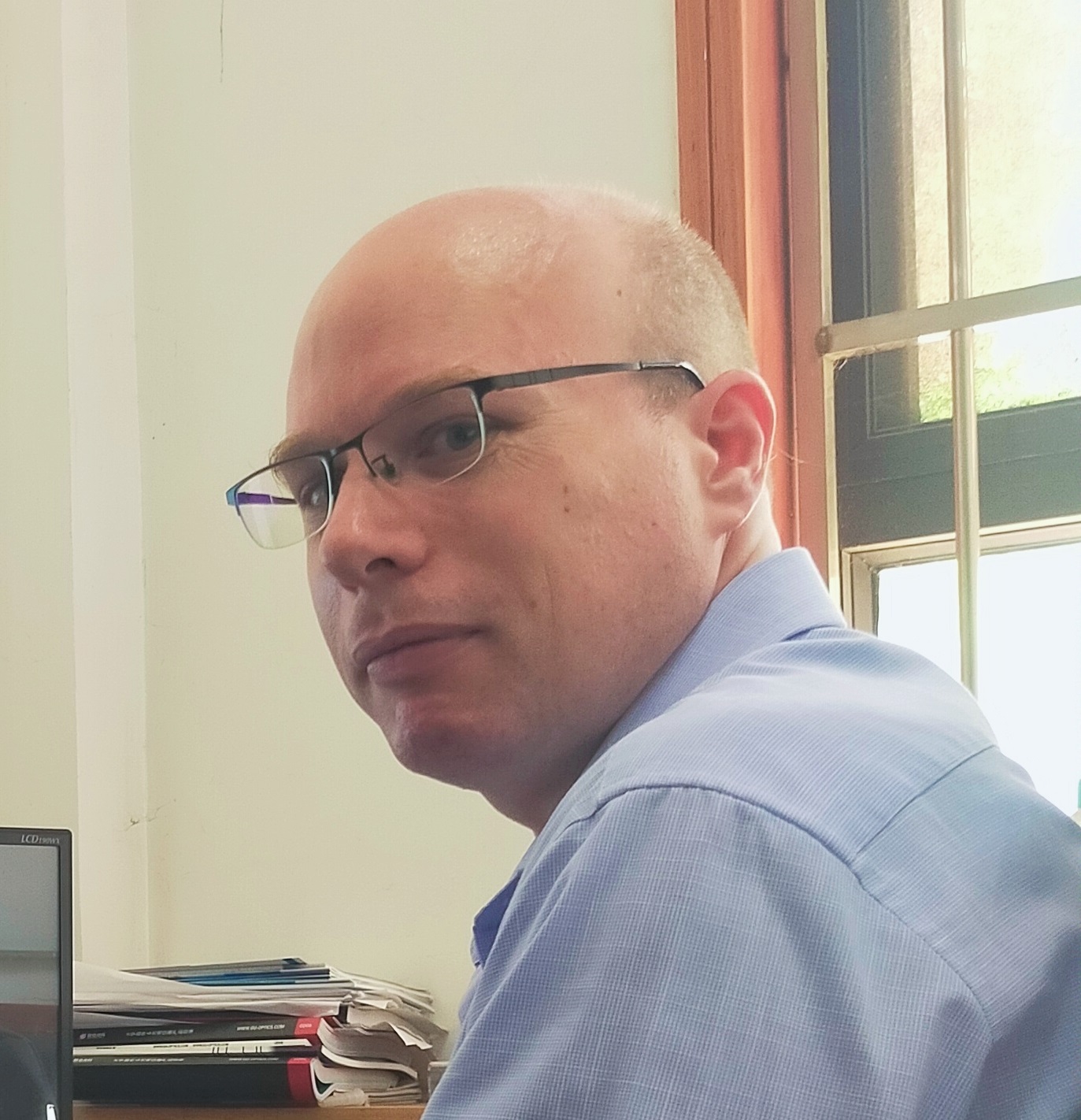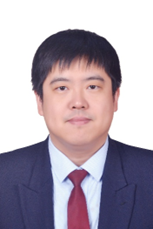Invited Speakers
Paul Briard
Associate Professor, Xidian University, ChinaSpeech Title: A neural network approach to estimate the particle shape distribution of nanorods using depolarized dynamic light scattering
Abstract: In a depolarized dynamic light scattering setup, particles undergoing Brownian motion scatter the light toward a photodetector with two polarization geometries: vertical-vertical (VV) and vertical-horizontal (VH). If the particles are nanorods (i.e., they have a cylindrical shape described by a diameter and a length), an analysis of the fluctuations of the light recorded in the VV and VH geometries permits information to be retrieved about the translational and rotational diffusion of the particles, thus allowing their mean diameter and length to be estimated. In this study, we estimate the mean diameter, the mean length, the variance of the diameters, and the variance of the lengths of nanorods using a generalized regression neural network (GRNN). To train the GRNN, training samples are randomly generated around an initial guess estimated using a Tikhonov regularization. The predictors of the GRNN are the normalized electric field autocorrelation functions of the scattered light recorded by the photodetector at multiple scattering angles. The translational and rotational diffusion coefficients of a nanorod are described using the bead-shell model. In the present work, the bivariate probability density function (PDF) of the diameters and lengths is Gaussian and unimodal. The possibility of extending this approach to estimate other characteristic information about a multimodal PDF will be also discussed.
Alei Dang
Associate Professor, Northwestern Polytechnical University, ChinaSpeech Title: Structural design and potential application of two dimensional material based electrode
Abstract: Freestanding and bendable film fabricated by 2D materials has demonstrated great potential as an electrode for energy storage devices, owing to their paramount flexibility, structural stability and high conductivity. Nevertheless, the unavoidable restacking of 2D material sheets substantially limits their electrochemical performance. Here, two dimensional-based film electrodes were fabricated through the different methods with mechanically shearing 2D Material sheets that are in liquid crystalline discotic lamellar phase assembly of liquid crystal, and intercalating 2D material interlayers with spacers/dopant methods. The introduced active materials provide abundant active sites to augment the electrode storage capacity. The enlarged interlayer spacing facilitates the transport of electrolyte ions. As a result, the optimized film electrodes exhibit a high specific capacitance, impressive rate capability and ultrastable cycling. Those works provide the effective routes for assembling 2D material sheets for high-performance energy storage devices.
Xuqing Liu
Professor, Northwestern Polytechnical University, ChinaSpeech Title: Molecular Engineering on Fiber Surfaces and Functional Fibers: Pioneering Sustainable Development
Abstract: This presentation delves into the cutting-edge realm of fiber surface molecular engineering, exploring various modification strategies that enhance the functional attributes of fibers. The focus is on leveraging covalent bond modifications, pi-pi interactions, topographical alterations, and van der Waals force modifications on fiber surfaces to achieve functionalization. These engineered fibers demonstrate promising applications in diverse fields such as wearable devices, composite materials, and electrocatalysis. The session will detail the processes and technologies involved in these modifications, outlining their potential to revolutionize traditional materials and introduce innovative solutions in high-performance applications. The discussion will also highlight recent breakthroughs and practical applications, illustrating how these engineered fibers can be effectively integrated into next-generation materials and devices.
Yuanzhen Chen
Professor, Xi’an Jiaotong University, ChinaSpeech Title: Biomass-based porous carbon materials for lithium-sulfur batteries
Abstract: The severe shuttle effect of polysulfides(LiPSs) is the main cause of capacity fading in lithium-sulfur (Li-S) batteries. Therefore, numerous researchers are currently investigating effective strategies to mitigate the shuttle effect of polysulfides. Our research focuses on employing physical and chemical approaches to enhance the performance of lithium-sulfur batteries. Given sulfur's insulating nature, it is imperative to establish a highly conductive network within the battery system. To address this issue, we have chosen pine-derived carbon materials with uniform and abundant pore sizes as interlayer materials for lithium-sulfur batteries. These materials not only provide a three-dimensional interconnected conductive network but also facilitate the growth of graphite whiskers inside the graphitized wood carbon pores, thereby offering additional reaction sites for sulfur cathodes and significantly enhancing battery performance. Building upon this foundation, we have incorporated Lewis acid-type perovskite materials with oxygen vacancies into the wood carbon pores to investigate their adsorption and catalytic mechanisms towards Lewis base-type polysulfides. The results demonstrate exceptional electrochemical performance without any degradation even after 500 cycles. However, due to its inherent brittleness, practical applications of wood carbon face challenges. Consequently, we have further developed porous carbon sieve/carbon sheet materials using cellulose as a raw material that can serve as both carriers for sulfur and membrane modification agents while still achieving outstanding electrochemical performance. Moreover, loading catalytic materials onto these carbon sheets enables more efficient conversion rates of polysulfides while maintaining a specific capacity of 493 mAhg-1 at a current density of 10C. Biomass resources are abundantly available and can be processed into porous materials suitable for various applications; furthermore, advancements in biomass-based carbon materials lay a solid foundation for lithium-sulfur battery applications.
Liping Feng
Professor, Northwestern Polytechnical University, ChinaSpeech Title: Preparation and Optoelectronic Properties of novel 2D BiOX semiconductors
Abstract: Two-dimensional (2D) semiconductors have great potential for application in low power, high-performance and flexible optoelectronic devices, such as tunnelling transistors, light-emitting diodes, photodetectors and photovoltaic cells. Recently, the novel 2D semiconductors of BiOI, BiOBr, and BiOTe have been prepared via space-confined chemical vapor deposition (SCCVD) method and the new optoelectronic devices based on BiOI, BiOBr, and BiOTe have been fabricated. Two types of synthesis mechanism are proposed for these BiOX crystals: (1) 2D nucleation and growth for BiOX sheets (bottom−up); (2) layer-by-layer oxidation and exfoliation for BiOX sheets and ribbons (up−bottom). Here, we report the synthesis of millimeter-size single-crystal 2D BiOI sheets and ribbons for the first time by using a sacrifice strategy to optimize the O2 partial pressure in an atmospheric-pressure growth system. The photodetectors based on the as-grown BiOI nanosheets demonstrate high sensitivity to 473 nm light. The Ion/Ioff ratio and detectivity of BiOI photodetectors can reach up to 1 × 105 and 8.2 × 1011 Jones at 473 nm, respectively. It is demonstrated that a moderate amount of H2O molecules in the SCCVD system greatly promote the formation of high-quality 2D BiOBr crystals because of the strong polarity of H2O molecules. The BiOBr-based photodetector was fabricated, exhibiting excellent performances with a responsivity of 12.4 A W−1 and a detectivity of 1.6×1013 Jones at 365 nm. The synthesis of nonlayered BiOTe with a 2D morphology was optimized by a machine learning (ML) strategy. The resultant 2D β-BiOTe flakes with a large domain size (∼120 μm) and ultrathin thickness (∼9.5 nm) indicate promising applications of ML in guiding the CVD synthesis of 2D nonlayered materials. Compared with the bulk BiOTe with an antiglass structure, the as grown 2D BiOTe shows a unique cation-ordering superstructure. In addition, the 2D BiOTe-based photodetector shows a prominent responsivity of 79.5 A W−1 at 375 nm. This work shows an efficient strategy for preparing 2D layered and nonlayered materials, and provides a brand-new platform to study the properties and applications of 2D materials.
Haiyan Zhu
Professor, Institute of Modern Physics, Northwest University, ChinaSpeech Title: Theoretical study on electroreduction of CO2 by copper based catalysts
Abstract: In the present era, CO2 emissions are at record levels and are likely to be even higher in the coming decades due to the accelerated depletion of fossil fuels. Electrochemical CO2 reduction reactions, powered by clean electricity generated from renewable energy sources, are an attractive route to CO2 utilisation and sustainable, valuable chemical production. Highly efficient catalysts with unique geometrical and electronic properties have been developed for the production of a wide range of C1 and multicarbon carbons (C2+) chemicals. Cu is the only metal with negative adsorption energy for *CO and positive adsorption energy for *H. It is easier to stabilise the adsorption of *CO, and CO has a suitable binding energy on Cu. Although metal Cu has unique catalytic properties for CO2, it still suffers from high reduction overpotential, slow kinetics, low energy conversion efficiency, poor selectivity, insufficient stability, and obvious competitive hydrogen precipitation side reactions for the electrochemical conversion of CO2. The introduction of a second metal into a copper-based catalyst to form a bimetallic catalyst is an effective method to modulate the selectivity and reactivity as the synergistic interaction between the two metals can modulate the binding strength and configuration of the intermediates on the catalyst surface.
Abdul Jalil
Associate Professor, Allama Iqbal Open University, PakistanSpeech Title: Computational Insights into Schottky Barrier Heights: Graphene and Borophene Interfaces with H- and H́-XSi2N4 (X = Mo, W) Monolayers
Abstract: The two-dimensional (2D) semiconducting family of XSi2N4 (X = Mo and W), an emergent class of air-stable monolayers, has recently gained attention due to its distinctive structural, mechanical, transport, and optical properties. However, the electrical contact between XSi2N4 and metals remains a mystery. In this study, we inspect the electronic and transport properties, specifically the Schottky barrier height (SBH) and tunneling probability, of XSi2N4-based van der Waals contacts by means of first-principles calculations. Our findings reveal that the electrical contacts of XSi2N4 with metals can serve as the foundation for nano electronic devices with ultralow SBHs. We further analyzed the tunneling probability of different metal contacts with XSi2N4. We found that the H-phase XSi2N4/metal contact shows superior tunneling probability compared to that of H́-based metal contacts. Our results suggest that heterostructures at interfaces can potentially enable efficient tunneling barrier modulation in metal contacts, particularly in the case of MoSi2N4/Borophene compared to MoSi2N4/graphene and WSi2N4/graphene in transport-efficient electronic devices. Among the studied heterostructures, tunneling efficiency is highest at the H and H́-MoSi2N4/Borophene interfaces, with barrier heights of 2.1 and 1.52 eV, respectively, and barrier widths of 1.04 and 0.8 Å. Furthermore, the tunneling probability for these interfaces was identified to be 21.3 and 36.4%, indicating a good efficiency of carrier injection. Thus, our study highlights the potential of MoSi2N4/Borophene contact in designing power-efficient Ohmic devices.







